

Netflix support is officially making its way to Linux, finally. Netflix is Finally Headed to Linux. In 2007, Netflix introduced video streaming to computer browsers.
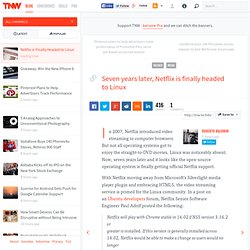
But not all operating systems got to enjoy the straight-to-DVD movies, Linux was noticeably absent. Now, seven years later and it looks like the open-source operating system is finally getting official Netflix support. With Netflix moving away from Microsoft’s Silverlight media player plugin and embracing HTML5, the video streaming service is primed for the Linux community. In a post on an Ubuntu developers forum, Netflix Senior Software Engineer Paul Adolf posted the following: Netflix will play with Chrome stable in 14.02 if NSS version 3.16.2 or greater is installed.
NSS stands for Network Security Services, which helps developers build secure applications. Of course at this point Netflix is on nearly every device in your home. We’ve reached out to Netflix for more details and will update this article when we hear back. Netflix on Linux = html5 Via Engadget. OS 5 Will No Longer be Based on Debian. Brian Manderville, the developer of the Descent|OS Linux operating system announced recently on his blog that the upcoming release of his distribution will no longer be based on Debian or anything else.
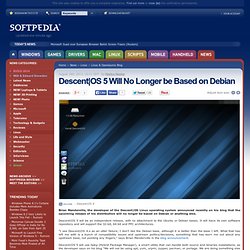
Descent|OS 5 will be an independent release, with no attachment to the Ubuntu or Debian bases. It will have its own software repository and will support the 32-bit, 64-bit and PPC architectures. "I see Descent|OS 4.x as an utter failure; I don’t like the Debian base, although it is better than the base I left. What that has left me with is a bunch of compatibility issues and upstream politics/decisions, something that has worn me out about any upstream base, not pointing any fingers," says Brian Manderville in the blog announcement. Open source is taking over the software world, survey says. It's been only a few weeks since the Linux Foundation released its report that enterprise use of Linux continues to rise, but on Wednesday fresh data came out that suggests the same is true of open source software in general.
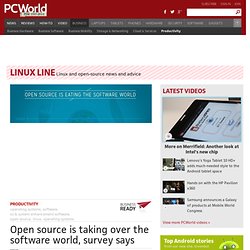
Specifically, Black Duck Software and North Bridge Venture Partners today announced the results of the seventh annual Future of Open Source Survey, which found that open source software has matured to such an extent that it now influences everything from innovation to collaboration among competitors to hiring practices. "It's been recognized that software is eating the world,” said Michael Skok, general partner at North Bridge Venture Partners. “Our survey points to the fact that open source is eating the software world. " With more than 800 respondents from both vendor and non-vendor communities, the 2013 survey reflects the views of the largest sample in its history. Black Duck and North Bridge Cost falls to the background Black Duck and North Bridge. From the ashes of Fuduntu rises FuSE Linux. Scarcely two weeks after announcing that it would be shutting its doors later this year, the Fuduntu Linux team on Sunday announced that they have decided instead to end the project immediately.
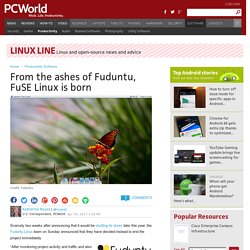
“After monitoring project activity and traffic and also reviewing all of the feedback from the community concerning our EOL, I have decided to end the project effective today,” wrote project team member Fewt in a weekend blog post. “This means that beginning with our last merge from testing to stable, which should happen today or tomorrow, there will be no additional updates to Fuduntu.” 50 million Apache OpenOffice downloads in a year. Apache OpenOffice downloads by OS Source: Apache Software Foundation Just a few days after the one year anniversary of the release of the first version of OpenOffice from the Apache Foundation (Apache OpenOffice 3.4) on 8 May 2012, the project can now boast 50 million downloads of the open source office suite.

More than 80% of these downloads have come from Windows users, with the rest of the downloads spread between Mac OS X and Linux. Over time, the percentage of Windows users has slightly increased at the expense of Mac OS X, with Linux usage hovering steady under 5%. Of the Windows downloads of Apache OpenOffice, most have come from Windows 7 machines (approximately 60%), followed by downloads from Windows XP (at around 30%). SerNet builds complete Samba 4 packages. Since the first free software implementation of the Active Directory Domain Controller (AD-DC) in Samba 4 became available , the large variety of potential scenarios for updating Samba 3 has made it difficult for Linux distributors to add the full set of features to their installation packages.
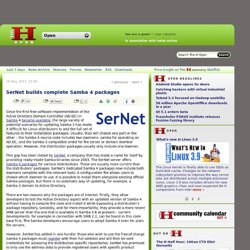
Usually, they will choose one part or the other – the Samba 4 source code includes two daemons: samba for operating an AD-DC, and the Samba-3-compatible smbd for file server or domain member operation. However, the distribution packages usually only include one daemon. This gap has been closed by SerNet , a company that has made a name for itself by providing ready-made Samba binaries since 2003. The SerNet server offers Samba 4 packages for various distributions. Canonical to maintain Linux 3.8 until August 2014. The Canonical-maintained Linux kernel version 3.5 is not listed at kernel.org.
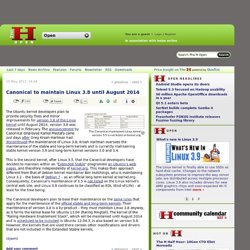
The Ubuntu kernel developers plan to provide security fixes and minor improvements for version 3.8 of the Linux kernel until August 2014; version 3.8 was released in February. The announcement by Canonical employee Kamal Mostafa came just days after Greg Kroah-Hartman had discontinued the maintenance of Linux 3.8; Kroah-Hartman oversees the maintenance of the stable and long-term kernels and is currently maintaining stable kernel version 3.9 and long-term kernel versions 3.0 and 3.4.
» Meeting held April 21 Fuduntu. April 27, 2013 by Lee Ward.
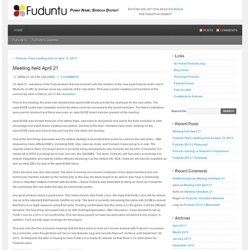
» Fuduntu Team meeting held on April 14, 2013 Fuduntu. April 15, 2013 by Lee Ward On Sunday, April 14, the Fuduntu team held a public meeting on IRC.
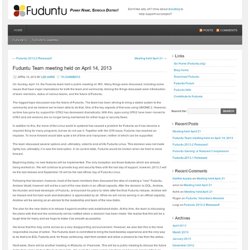
Many things were discussed, including some issues that have major implications for both the team and community. Among the things discussed were introduction of team members, status of various teams, and the future of Fuduntu. Farewell, Fuduntu: The Untimely Demise of a Winning Linux Distro. The people behind some Linux distros have "the warrior mindset," observed Google+ blogger Brett Legree.
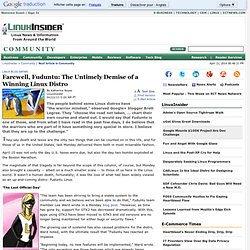
They "choose the road not taken, ... chart their own course and stand out. I would say that Fuduntu is one of those, and from what I have read in the past few days, I do believe that the warriors who are part of it have something very special in store. I believe that they are up to the challenge. " ManageEngine OpManager, a powerful NMS for monitoring your network, physical & virtual (VMware/ HyperV) servers, apps & other IT devices. Deploy and start monitoring in less than an hour. DistroWatch.com: Put the fun back into computing. Use Linux, BSD. Ground control to Major Tux: Space station dumps Windows, now uses Linux. For reasons involving reliability — which is semi-kinda important in low-Earth orbit, apparently — our fellow nerds living aboard the International Space Station have made the switch from Windows to Linux for astronauts’ laptops.
The space nerds will get training from the Linux Foundation for the upgrade to Debian 6. The foundation has actually customized two courses specifically for NASA astronauts’ needs, including a basic Linux user course and more advanced coursework on how to develop applications for Linux. Previously, the laptops aboard the ISS had been running Windows XP.
The United Space Alliance manages the NASA/ISS computers. Linux-based Robonaut 2 preps for active ISS duty · LinuxGizmos.com. NASA’s Linux-based “Robonaut 2″ is undergoing extensive testing on the International Space Station (ISS), and will soon be put to work. The humanoid Robonaut 2 will soon receive a major upgrade that will provide legs and an expanded battery pack, enabling it to perform more duties, including space walks. Robonaut 2 arrived at the ISS in Feb. 2011, billed as the first dexterous humanoid robot in space, but it has yet to see much action. Recently, however, the bot has been undergoing extensive testing of its motor controls and vision system. Robonaut 2 initially consisted of a head, torso, arms, and hands (click images to enlarge) As seen above and below, Robonaut 2 currently lacks legs, using a movable stanchion as a foundation for its humanoid torso, arms, articulated fingers, and helmeted head.
Robonaut 2 performing routine chores.